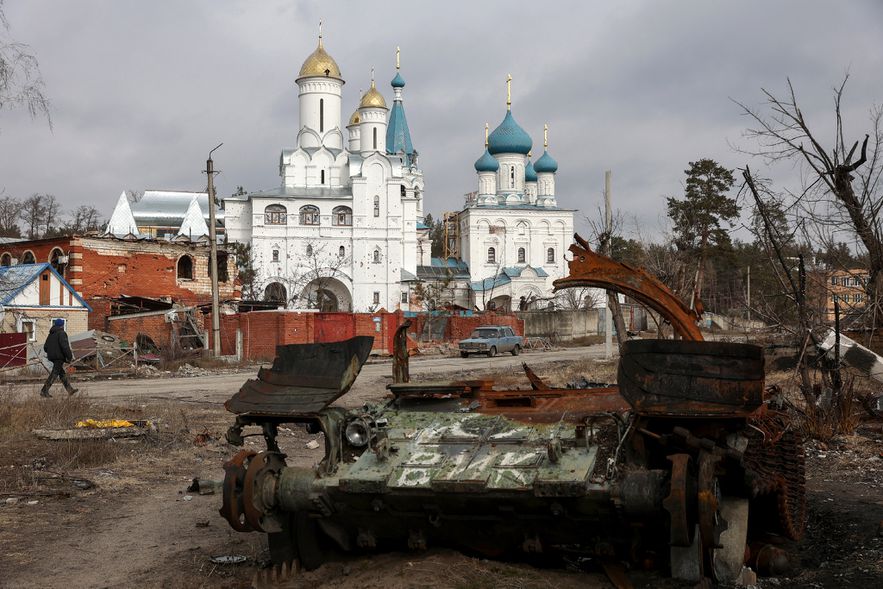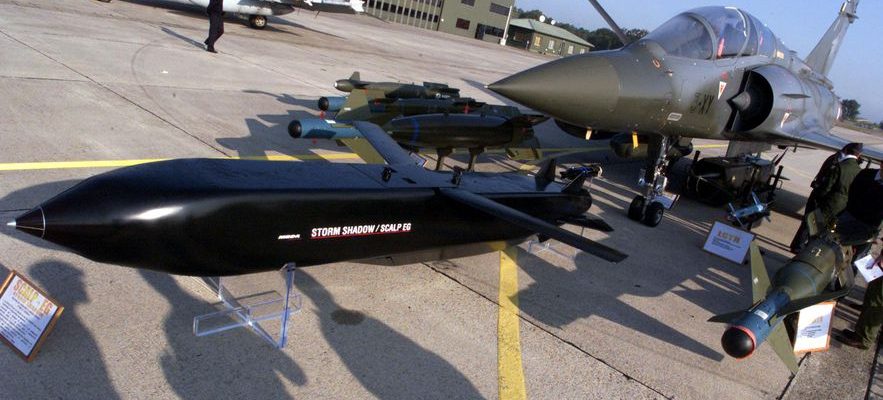After more than three months of counter-offensive, the Ukrainian army continues its fierce fight to reconquer its lost territories. On September 11, the Ukrainian Ministry of Defense claimed “successes”, particularly on the southern front, where Kiev is concentrating its efforts, with the ambition of reaching the city of Tokmak, or even Melitopol, two leading cities. in the Russian defensive system in the south of the country. But the modest progress recorded so far has raised questions about kyiv’s ability to achieve its objectives before the arrival of the rainy season, which could complicate the maneuvers of its armored vehicles. “If we, [les pays occidentaux,] made it clear that we want Ukraine to win this war and push Russia beyond the 1991 borders, then there would be no hesitation in providing them with everything they need to do so,” he said. General Ben Hodges, who commanded the US Army in Europe from 2012 to 2017. Interview.
L’Express: What is your assessment of the Ukrainian counter-offensive which has lasted for more than three months?
Ben Hodges: The Ukrainians still have the initiative and continue to move forward, so, contrary to what some claim, this is absolutely not a failure. It should also be kept in mind that land gains are only part of this counter-offensive, which also includes a host of other operations such as long-range drone strikes, naval drone attacks, commando raids and acts of sabotage in Crimea and other Russian-occupied territories. All of these elements constitute what NATO calls “multi-domain operations”. And they are putting enormous pressure on Russian leaders and commanders on the ground. So this counter-offensive is really progressing, and I think it will eventually achieve its objectives.
Is a Ukrainian breakthrough still possible in the coming weeks?
Quite. Already, the Ukrainians made the right choice by deciding to concentrate on destroying Russian artillery. Indeed, what makes the Russian defenses so difficult to breach is not only the mines which have been scattered in very large numbers, but also the fact that, every time the Ukrainians try to clear mines, they are shelled by opposing artillery. Therefore, focusing on the destruction of this artillery can make Ukrainian progress less difficult.
And it seems that this is now having very positive effects: the proof is that Russian artillery is no longer what it used to be. This is an important first adjustment, which can make one optimistic for the future. Additionally, we know that the Russians lost a lot of soldiers. Their ability to strengthen or launch a counterattack appears reduced. Therefore, if Ukrainian forces manage to achieve a breakthrough, they could make real gains, although of course these are unlikely to be uniform across the front line.
Some observers, particularly in Washington, have nevertheless criticized the “slowness” of the Ukrainian counter-offensive…
Some people, who are more than 8,000 kilometers away from the front, make observations without having complete information. Therefore, in my opinion, they should refrain from making such assessments. Then, this is partly linked to the fact that there is still no consensus in Washington, nor probably in Berlin, Paris or London, on the nature of our strategic objectives for Ukraine. If we made it clear that we want Ukraine to win this war and push Russia beyond the 1991 borders, then there would be no hesitation in providing it with everything it needs to do so. The first task of Western leaders is to define the goal, then provide the means to get there. And, for the moment, we have not yet done it.
What equipment do Ukrainians need most today?
They need long-range precision strike capability. For the moment, the Ukrainians have received French Scalp and British Storm Shadow missiles, but German Taurus missiles and American ATACMS would also be very useful to them. These missiles can reach targets several hundred kilometers away and would allow them to strike all of the territories occupied by the Russians, and in particular Crimea, which constitutes the decisive terrain of this war. Such weapons could help isolate the peninsula from other occupied territories, which would be a prerequisite for its liberation.
France delivered long-range Scalp missiles to Ukraine.
© / ACK GUEZ / AFP
Next, the Ukrainians need air defense systems to protect the population and infrastructure. Let us not forget that civilians are killed almost every day by Russian strikes. Finally, the Ukrainians need ammunition: whether artillery shells, rockets and missiles. And this need is not about to disappear. In this regard, we can be pleased that Western countries are trying to increase their production in this area.
Last week we saw the first image of a Challenger tank 2 destroyed. Is this a bad sign?
This is the first Challenger 2 tank to be damaged after weeks of engagement. Additionally, remember that this was caused by a mine and the crew survived. In reality, it is not surprising that vehicles are damaged or destroyed in this type of high-intensity combat. There are no magic weapons. My country, the United States, also lost Abrams tanks in Iraq. No one should therefore be surprised or alarmed that a Challenger 2 was damaged. This type of event unfortunately happens regularly in war.
Washington recently indicated that it wanted to deliver depleted uranium munitions to Ukraine. What role can these munitions play?
Depleted uranium munitions – which were created in the 1970s – exploit the very high density of this metal. When these munitions are fired from a tank at a speed of approximately 1 kilometer per second, the kinetic energy released on impact is extremely powerful. This makes it particularly useful for piercing armor and will therefore strengthen Ukraine’s anti-tank capabilities. However, these munitions have nothing to do with nuclear weapons, unlike the conflation that is sometimes made due to the use of uranium.
What state is the Russian army in today?
First of all, we see that the Russian forces are putting up significant resistance in many places on the front. Overall, they are defending better than they have attacked in recent months. This is why the fights are so hard and deadly. There are, however, increasing reports of poor morale on the Russian side. And this is only going to get worse as the weather worsens throughout the fall and winter, since the Russian system does not have the logistics to adequately care for its soldiers at this time. period.

A destroyed Russian tank in front of a damaged church in Svyatohirsk, Donetsk region, March 1, 2023.
© / afp.com/Anatolii Stepanov
Next, it must be emphasized that the Russian air force remains quite ineffective after nineteen months of conflict. For example, it fails to destroy supplies of ammunition and equipment sent to Ukraine. The same goes for the Russian Black Sea Fleet, which no longer approaches the Ukrainian coast for fear of being targeted by drones and anti-ship missiles. To all this we can add that the Russian defense industry is in tatters. The fact that Russia is at the point of requesting munitions from North Korea is telling. Ultimately, this proves that the sanctions decided by the West have an effect, contrary to what we sometimes hear.
The mutiny led by Prigozhin last June also revealed cracks within the Russian command…
Absolutely. The Wagner mutiny and then the public execution of Prigozhin revealed what we had always suspected: that all members of the Russian hierarchy hated each other. Today we see that Putin’s most effective generals are either dead, fired, or in prison. On the other hand, the Minister of Defense, Sergei Shoigu, and the Chief of Staff of the Armed Forces, Valeri Guerassimov, are still in office. The message this sends is that loyalty is more important than competence. As a result, good commanders are encouraged to keep quiet and not report problems, so as not to take risks. Which can only work in favor of the Ukrainians.
Will Putin’s power crumble as the conflict drags on?
Certainly. The fact that a mutiny like Wagner’s took place is a good indicator of the seriousness of the situation. This is not the sort of thing that happens in an army confident in its chances of victory. It seems clear that the weakness of the Russian system and the endemic corruption in the country do not constitute the best formula for maintaining strong leadership. Therefore, we cannot exclude the scenario of a collapse of the regime. If this were to happen, however, it would come from within. Putin probably has reason to be wary of the people around him and how they might perceive weakness or vulnerability.
In any case, we must prepare ourselves for this possibility and not be afraid of it. The best thing that could happen to Europe would be to see a total defeat of the Russian forces which would, in turn, bring some form of change to the Russian regime. Otherwise, we will continue to see people like Putin rise to power. And Europe’s security will always be threatened.
